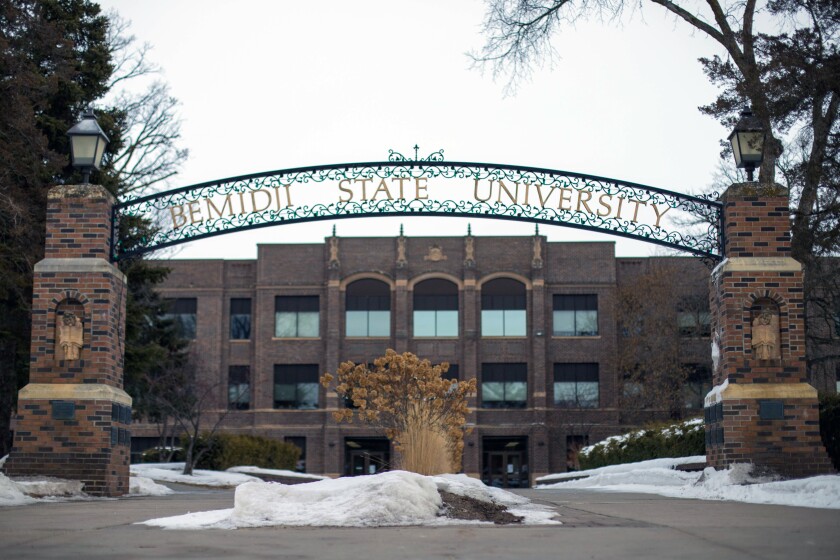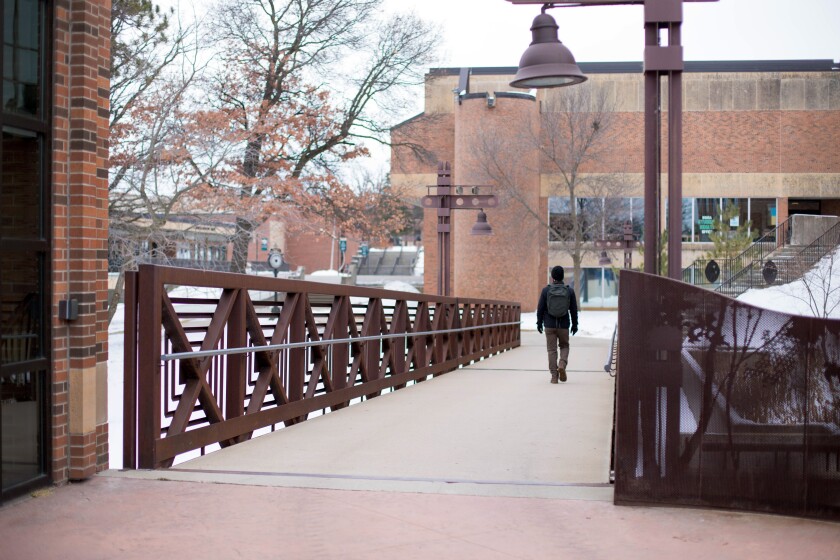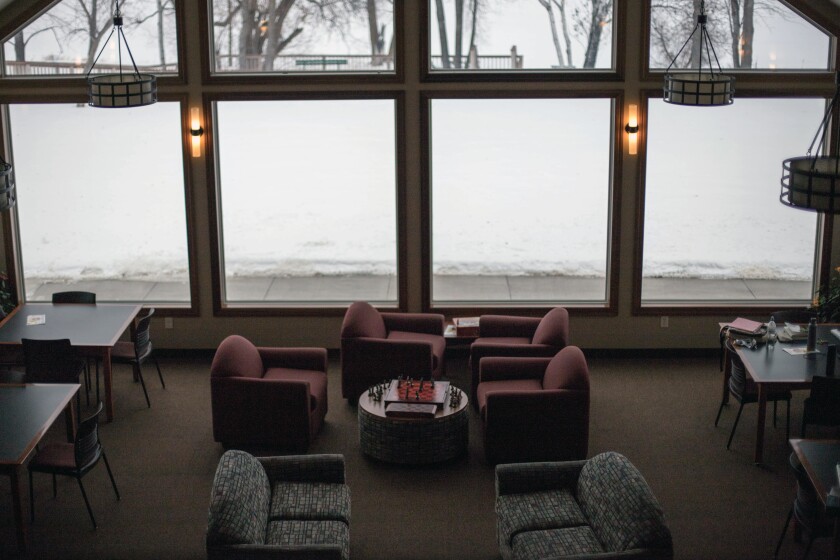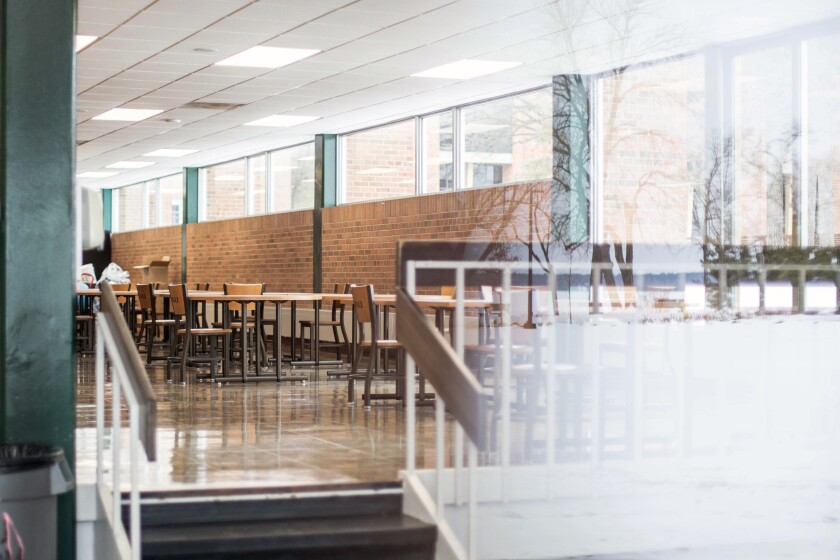BEMIDJI -- Choosing a college -- or whether to go at all -- has never been a simple choice, and in the age of COVID-19, there are even more factors to consider when making this weighty decision.
Visits are virtual, tours are socially distant, many classes are online, and the oft-romanticized “typical college experience” is now almost nonexistent.
ADVERTISEMENT
We spoke with Bemidji State University admissions staff, Leech Lake Tribal College and Oak Hills Christian College as well as Bemidji High �������� counselors about one of the biggest decisions in many high school students’ lives -- whether or not to go to college -- and how this choice has been affected by the pandemic.

Visits go virtual
Close your eyes and picture a typical college visit. Is it a crisp fall day? Is the tour guide walking backward and maybe a bit too focused on the behavior of the university’s squirrels? Do you buy a generic sweatshirt that says “SCHOOL NAME”?
Well, things have changed. While some colleges still offer tours, some only allow admitted students to tour, while others are moving their tours fully virtual, so dining halls and dorms can be browsed from the comfort of your couch.
BHS College and Career Resource Advisor Barry Cervenka said, “You can click on the virtual tours and get a pretty good idea what the dorm rooms look like, what the food court is like, what the administration and educational buildings are like -- so you can get a pretty good idea without having to actually be on campus.”
, but with some limitations. Some schools, like LLTC, still have campuses closed to the public and aren’t offering tours in person at all. , with appointments strongly preferred.
ADVERTISEMENT
“We do still offer tours, at various times we’ve had to put those on hold, due to different restrictions. (When we have tours) they are limited to two students and two guests per student,” said Bemidji State Director of Admissions Andy Wright. “In the fall we had limited those tours to only the students who had been admitted, but beginning this January, we are opening that up to any students who are interested in coming for a tour, because we know there’s a lot of high school juniors who are trying to get a head start on that decision-making process.”
LLTC President Raymond Burns said, “The campus is physically closed, so the students haven’t been allowed to come on campus, . We’re continuing to try to find ways to introduce the campus to students virtually, and I think what we’re realizing is, by the time we get this right, we won’t need it anymore, and that’s a good thing.”
Wright said that everything else at BSU -- besides the traditional tours -- has moved online, from preview days, to academic open houses, to college fairs and department visits.
These college visits go both ways -- every year, tons of college admissions representatives visit high schools around the state. This has also changed.
Zoom calls have taken the place of traditional high school representative visits, Cervenka explained.
“During a traditional time of ‘uncovid,’ I would host between 30 and 50, depending on their schedules,” he said. “Students would get excused from class to come in and visit with the colleges that they’re interested in. In lieu of doing the actual in-person visits, a lot of those reps have done Zoom calls.”
These calls may range from one student or a handful of students or many students talking to a representative, which Cervenka said happened in person as well.
ADVERTISEMENT
Wright said he saw this change coming, “I’ve now been in the world of admissions for 20 years, back when I interviewed to be an admissions recruiter at the first school I worked at, they said, ‘What do you see that is going to change in the future?’ and I said, ‘There will come a time where we won’t go visit high schools in person, we will meet with them over the computer, they’re sitting in their classroom, we’re sitting in our office.’ Now I didn’t think it was going to be a pandemic that was going to cause that to happen.”
“I still think there’s value in those visits, that one-on-one connection we can make, because it’s so much easier to read facial expression and engagement, but I do see an opportunity where we can continue to use this format that we have,” he added.
While both Wright and Cervenka praised colleges for their flexibility and creativity when it came to moving things online, both said they can’t wait until it can be done in person again.
“Pretty much everyone in the admissions field cannot wait for that time where we can engage again face to face,” Wright said.
“Overall, the colleges have done a fantastic job of trying to make up for 1. Not being able to go to a campus and tour, and 2. Make up for their reps not being able to come and visit our high school,” Cervenka added, but mentioned it still doesn’t compare to the real thing.

ADVERTISEMENT
Small schools, big opportunities
Some students who may have had their sights set on a large state university pre-COVID may now be looking for something smaller and closer to home. Smaller schools are noticing this.
Burns said LLTC is trying to shift focus from what they can’t offer to what they can -- for example, some of their major selling points like events and student cultural activities can’t happen, but they do serve as an affordable option during this time.
“Some of our biggest selling points -- we just can’t do them right now,” he said. “Some students are taking advantage of the fact that a college like ours has a very low tuition rate compared to other colleges. They can get a lot of their (general education) credits out of the way taking our courses.”
Oak Hills is offering in-person classes during this time, which has been a draw for some students for whom online learning can be a challenge. The school can still offer that sought after “college experience” on a smaller scale.
“We’re fortunate, we’ve got a great outdoor campus, it’s not so huge, and because we’re smaller we can still manage to do some things without breaking any rules,” said Leesa Drury, vice president of advancement and marketing at Oak Hills.
Wright said over the last few years there has been a nation-wide trend of students staying closer to home when choosing a college.
Oak Hills has tried to capitalize on this recent trend. “I think it is more appealing right now for parents and students to commit to local,” Drury said.
ADVERTISEMENT

Test anxiety
Typically, Minnesota high school juniors take the ACT test at least once in the spring of their junior year, during a school day. Students generally have opportunities to take the ACT or SAT on their own accord before or after then. This year, however, has also been different. Starting last spring, access to standardized testing exams has been limited.
ACTs and SATs aren’t the sort of exams that can easily be given online, so many students did not have the opportunity to take them, or at least take them as many times as they would have liked.
The vast majority of colleges went “test-optional” for admissions in 2020 and 2021, meaning students will be considered for admission solely on their GPA, class rank, essays and other application materials.
BSU and Oak Hills both went test optional for at least 2020-2022. LLTC never required ACT or SAT test scores for admission, as the school has its own placement test administered upon admission.
“The majority of our students have not sent us a test score,” Wright said of BSU. “We recognized that was going to be the case so we remained test-optional -- we don’t yet require it.”
ADVERTISEMENT
Wright said this option will likely be available at BSU for many years to come.
One thing many colleges first failed to consider was whether or not test scores were needed to award scholarships, something many students rely on.
Cervenka said one of his biggest goals was to save students money -- to avoid being saddled with lifelong student loan debt. Drury at Oak Hills vouched for this, smiling as she said she remembered visiting Cervenka’s office once to advocate for the college, and he showed her a whole cabinet filled end-to-end with different scholarships.
“Part of my job is to help kids apply to college, help them through the financial aid process, walk them through the whole thing from the beginning to the end of their senior year,” Cervenka said.
BSU soon realized the test score requirement could be an issue and amended this.
“We amended our scholarship requirements, where we also have a test-optional version. Whichever one of those versions (with or without a test score) makes a student look the best, is the one that we’re going to use,” Wright said of BSU. “In all likelihood, we will give than we have ever given out in the past, because students who in the past may not have scored as well on an ACT/SAT, now if we are only looking at their GPA will have the opportunity to get that scholarship.”
BHS students do have an opportunity to take the ACT in school this spring -- juniors can register until Feb. 1 to take the ACT for $73 in the BHS gym on March 30.

To defer or not to defer
With all of the recent changes to the university sphere, some students are deciding not to go at all, or defer their decision for a semester or year.
Cervenka said some BHS students have opted to take gap years before enrolling in college.
“Because of COVID, we have seen students change their minds,” Cervenka said. “I’m very busy right now helping a lot of students I helped last spring that graduated and applied to certain colleges, that in the end, this summer at some point decided, ‘You know what, I’m not going to go to college my first year, I’m going to take a gap year,’” he said. “There’s a small percentage that decided to change their college or their choice to even go to college, but are now looking to do that again.”
Burns said in his experience, many of the students choosing to defer are doing so because they feel they will miss out on opportunities during this time.
“I think a lot of students are just saying, ‘I’m not going to spend the same amount of money for a totally different experience.’ You can’t blame students, they want something out of a college, and if they are not going to get it, they have that option,” he said.
Wright said a larger than usual number of students coming into BSU have chosen to defer, many for financial reasons.
“We saw a much bigger number of students who either let us know that they have decided they’re going to hold off for a semester or a year, and we also saw some students who went through the entire process of getting enrolled and then because of various reasons a month before, or in some cases a day before the semester, said ‘I’m actually going to not go to college this semester, I’m going to wait,” he explained.
Wright said the most common reasons for this were: not being able to live on campus, health concerns, or worries about paying for college, but that he thought the students affected most were ones who fared worse academically and therefore didn’t receive as many scholarships.
“Students who were stronger on the GPA and test score criteria were more likely to still go to college whereas students who were good, but maybe weren’t as strong were more likely to defer, and that could be because of finances, that could be because of just general concerns,” he said. “The number of merit scholarships we offered this year for fall of 2020, was the same, even though we hadn’t changed our (test score) criteria at that point, (meaning), it was the non-scholarship students that weren’t enrolling.”
Cervenka echoed this, explaining that students who have long planned to go to college are not wavering in their decisions, but students who might’ve been more on the fence about whether or not to go have been the ones considering skipping.
“The students who have kind of tracked themselves through high school by taking certain courses -- let’s say someone always knew they wanted to go into the medical field of some sort,” he said. “Regardless of COVID they are continuing on.”










